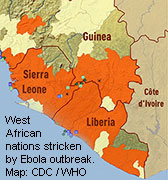
THURSDAY, Oct. 23, 2014 (HealthDay News) — A large influx of international aid is needed, and soon, if West Africa is to avoid tens of thousands of deaths from the widening Ebola crisis, a team of Yale University researchers predict.
Using a specially designed mathematical model, the researchers looked at the possible future of the outbreak in just one densely populated county of hard-hit Liberia — Montserrado County, home to the capital city of Monrovia.
The researchers said that if international aid isn’t delivered to Liberia in sufficient time and quantity, by Dec. 15 Montserrado County will have more than 170,000 cases of Ebola — 12 percent of its population — and more than 90,000 deaths.
However, if the international community ramps up efforts by Oct. 31, almost 98,000 of those cases could be avoided.
“Our predictions highlight the rapidly closing window of opportunity for controlling the outbreak and averting a catastrophic toll of new Ebola cases and deaths in the coming months,” study senior author Alison Galvani, professor of epidemiology at the Yale School of Public Health, said in a university news release.
“Although we might still be within the midst of what will ultimately be viewed as the early phase of the current outbreak, the possibility of averting calamitous repercussions from an initially delayed and insufficient response is quickly eroding,” she added.
What’s needed, according to the Yale team, are better diagnosis, treatment and prevention efforts on the ground in Liberia and in the two other countries affected by Ebola, Guinea and Sierra Leone. Essential elements include more Ebola treatment center beds, a fivefold increase in the rapidity at which new Ebola cases are identified, and the distribution of protective kits to households containing anyone already infected to cut the rate of Ebola’s spread, the researchers said.
Even if international interventions were to be delayed until Nov. 15, about 54,000 new cases in Montserrado County might still be averted, the researchers said.
According to the latest estimates from the World Health Organization, about 10,000 cases of Ebola have so far been reported in the three affected countries, and more than 4,900 people have died.
Time is of the essence, the researchers said, to prevent the outbreak from exploding into something much less containable.
“The current global health strategy is woefully inadequate to stop the current volatile Ebola epidemic,” study co-author Dr. Frederick Altice, professor of internal medicine and public health at Yale, said in the news release. “At a minimum, capable logisticians are needed to construct a sufficient number of Ebola treatment units in order to avoid the unnecessary deaths of tens, if not hundreds, of thousands of people.”
The study, funded by the U.S. National Institutes of Health, was published online Oct. 23 in The Lancet Infectious Diseases.
More information
For the latest on the West African Ebola outbreak, head to the World Health Organization.
Copyright © 2026 HealthDay. All rights reserved.

